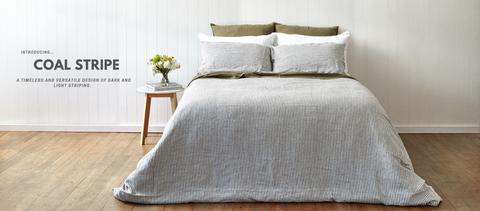How Often Should You Wash Your Sheets?
Posted on 06 June 2018
Your bed is the most important piece of furniture in your home, so it makes sense to take extra measures to prevent your sleep sanctuary turning into a slumber party with billions of gatecrashers.
The list of unwanted guests may include:
- 160 million skin cells shed overnight
- Millions of thriving bacteria and fungi overstaying their welcome
- Uninvited dust mites feasting on all those dead cells
- Animal dander, dirt, lint and dust mite debris
In only 1-2 weeks this build-up of gunk can trigger sniffing, sneezing and wheezing since the microbes are so close to your nose and mouth that you’re forced to inhale them. Even if you don’t suffer allergies, you can still exhibit an allergic response, which can be detrimental to your health as well as deprive you of a good night’s sleep.
The good news is washing your sheets on a regular basis can prevent your bed from blossoming into a microbial ‘hot bed’.
SHEETS:
It’s a good practice to launder sheets weekly, especially when the weather is hot or humid, although up to 10 days in cooler conditions is acceptable.
PILLOWCASES:
Once a week as pillowcases have the most build up of oil, dirt and bacteria with particles easily breathed in being so close to your nose and mouth.
QUILT/DUVET COVERS:
Having less contact with skin than a fitted sheet, these can be washed every 1-2 weeks.
PILLOWS:
Launder at least twice per year
QUILTS/DUVETS:
It’s recommended to use a quilt cover with any quilt, however your quilt should be cleaned bi-annually (more often if used without a quilt cover) depending on laundering instructions… e.g. goose down quilts being dry-cleaned.
MATTRESS COVER:
Fluids can seep through sheets so it’s important to launder your mattress protector or cover 6 times a year. While you’re mattress is exposed, be sure to run a vacuum over the surface to remove any dust build up. Even more frequently if you’re an allergies sufferer.
DRYING:
It’s recommended to dry sheets and pillowcases in direct sunlight if possible, as UV light is effective in killing micro-organisms. Running a hot iron over your pillowcases can further enhance the ability to kill any leftover bacteria.
STORING:
To avoid mildew growth, ensure sheets are fully dry before storing in a cool closet or drawer. Avoid storing sheets in plastic containers, which can trap moisture and provide conditions for microbes to thrive.
A consistent laundry regimen will ensure your sheets are clean and hygienic all year round, but equally important increase the number of times you get to experience those irreplaceable ‘fresh sheet feels’ when you crawl into bed!


